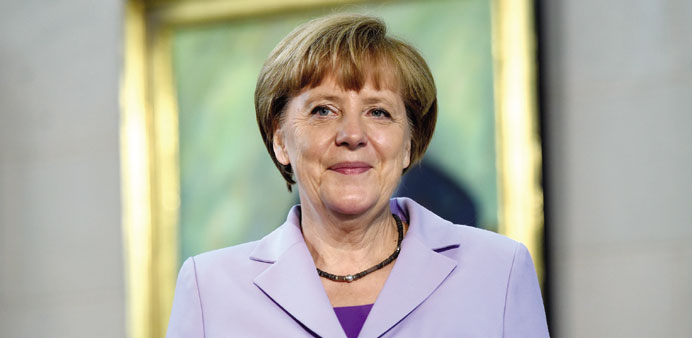Angela Merkel: the German chancellor has found herself walking a very thin line. On the one hand she has been trying to quell a possible rebellion in her government’s ranks by imposing very strict conditions on any new bailout plan for Greece.
By Andrew McCathie/Berlin/DPA
After helping to spearhead moves to throw cash-strapped Greece a new financial lifeline, Angela Merkel now faces the tough task of selling the plan to sceptical members of her conservative political bloc.
The German parliament is set to meet later this week to consider giving the government a mandate to negotiate the new three-year 82bn-86bn euro rescue plan with Athens. But months of tortuous and acrimonious negotiations with Greece have left lawmakers in her conservative Christian Democrat-led (CDU) group increasingly uneasy about pouring more taxpayers’ money into Greece.
“Merkel is interested as any democratic leader in winning the next election,” said Irwin Collier from Berlin’s John F Kennedy Institute.
“She is reflecting the general German policy consensus of austerity and hard money,” he said, with the chancellor unable to risk a backlash domestically by appearing to agree to too many concessions to Greece. But the Greek drama could still represent the moment of truth for Merkel as Europe’s predominant leader, with evidence already emerging that the deal hammered out in the early hours of Monday in Brussels might come with unexpected costs.
Merkel has found herself walking a very thin line. On the one hand she has been trying to quell a possible rebellion in her government’s ranks by imposing very strict conditions on any new bailout plan for Greece.
On the other hand, she has to ensure that her political legacy is not eclipsed by a major setback to Germany’s long-cherished quest for greater European integration with a tough debt deal that could eventually force Greece to exit the euro.
The weekend of high drama in Brussels to keep Greece in the euro also served to expose the fault lines in the eurozone, with tensions quickly surfacing between the members of the common currency as the talks dragged on. This resulted in the currency bloc’s leading powers such as Germany, France and Italy finding themselves pitted against several of the region’s smaller states which have been highly critical of a new Greek debt deal.
Merkel emerged from the marathon meeting to declare that “the benefits (of the deal) outweigh the disadvantages”. For many Greeks, Merkel embodies what they see as the evil of fiscal austerity. Back in Germany, yesterday’s agreement was greeted with scepticism amid concerns as to whether Greeks would deliver on their side of the bargain and ram the reforms, which include revamping Greece’s tax and pensions systems, through parliament.
“I don’t see any advantages,” said Hans Michelbach, a parliamentary member of the Christian Social Union (CSU), which is the Bavarian-based associate party of Merkel’s CDU.
A more-than-expected 29 members of Merkel’s 311 CDU-led parliamentary bloc rejected extending the Greece bailout in February.
According to German media reports, up to about 100 of the chancellor’s own parliamentarians have told her they would not back a new bailout for Athens in another parliamentary vote. A rebellion of this dimension would represent a severe blow to her political authority.
This is despite top officials from the junior member of Merkel’s coalition, the left-leaning Social Democrats, having indicated they will back new negotiations with Athens. The problem for Merkel is that the sense of frustration among German voters with Athens over the debt deal has grown even more intense since the Greeks voted a defiant “no” to further budget cuts and reforms in a referendum.
The Greek vote was “a slap in the face for all Europeans”, said the Federation of German Industry (BDI), with Germany’s powerful business sector having argued that Greece’s euro membership could be sacrificed for the sake of a stable currency.
“After months of conflict and Greece’s unpredictable politics, Europe expects a clear signal for the long overdue new start in Greek politics,” said BDI managing director Markus Kerber yesterday.
The risks are also considerable that yesterday’s deal could still unravel. Besides the German and Greek parliaments, the legislatures in several countries that have been highly critical of further aid to Greece also have to approve any rescue package for Athens.
For Merkel, the crisis that has engulfed Greece goes beyond economic considerations. It also has a geo-political dimension, with Greece in the heart of a volatile part of the region.
Athens and many of its Balkan neighbours have also emerged as a target for Russian President Vladimir Putin to promote instability and to pile on the pressure on Europe, adding to worries in the US about the Greek crisis.
In addition, Greece is also a major focal point of refugees trying to enter Europe, which has raised the pressure on the Europeans to head off the threat of a financial and political meltdown in the country.

